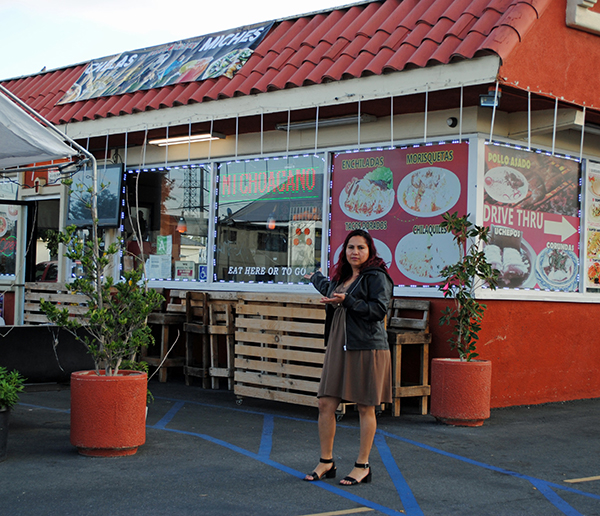By Alfredo Santana
Contributing Writer
BELL GARDENS — Maria Zacarias grew tired of unlicensed food vendors setting up shop across the street from her restaurant, selling dishes on the curb similar to those she prepared for her customers, either for indoor dining or for takeout.
At the restaurant called El Zarape Michoacano on Gage Avenue, Zacarias said high inflation combined with cheaper sidewalk food have contributed to a slowdown in sales that may push her to shut down a second store located near Eastern Avenue.
“Street food customers are not aware of the health threats and unfairness of food shops setting up blocking sidewalks,” said Zacarias, who opened her restaurant 14 years ago. “Several restaurateurs are afraid of facing off those vendors. They hide because they don’t want to be shouted at or physically attacked.
“We barely made it out from a debilitating pandemic, and are sweating hard to stay afloat,” she added.
Zacarias and a group of about 15 restaurant owners staged a protest last week outside Bell Gardens City Hall to pressure authorities to enforce an ordinance that requires street vendors to obtain county and local permits or cease operations.
Restaurant owners say street hot food vendors install tents, tables, chairs and portable kitchens where they cook raw meats, leave grease and trash on the sidewalks and put customers’ health at risk.
Approved on May 2021, the city ordinance bans stationary food vendors on sidewalks if they have not obtained a business license along with a health permit issued by the county.
At its Feb. 13 meeting, the City Council voted for a new approach to educate street vendors about the benefits to obtain permits, train staff to begin code enforcement, direct the Community Development director to reach out to state legislators to amend state laws and launch a campaign promoting shopping at brick-and-mortar restaurants.
The five council members also directed city staff to work on ordinance changes to align with a new state health law that decriminalizes street food vendors if they lack a health permit many consider are hard to get.
The City Council measure is an attempt to resolve a brewing conflict that began to take shape when California legislators approved SB 946, a law signed by then-Gov. Jerry Brown that starting in 2019 ended criminal penalties for sidewalk vending.
A public document from Community Development Director Gustavo Romo revealed that only 13 out of about 30 sidewalk vendors in the city are licensed.
The unlicensed operators include 10 taco stands and seven tamale and corn sellers, compared to 10 licensed fruit carts and three flower vendors.
“The primary concern from brick-and-mortar businesses is that the city is not enforcing its ordinances by requiring hot food vendors to obtain health department permits,” Romo said at the meeting. “In addition, they believe there should be restrictions on like businesses locating in front of their business.”
The city’s Ordinance 914 indicates that sidewalk sale permits should be renewed once a year and include a list of up to three people working on the makeshift shops.
If administrative enforcement begins, violators can be punished with fines of $100 for a first offense, $200 for a second offense and $500 for a third offense within 12 months.
Liens can be assessed on a vendor’s property or vehicles, but at this point impounding of cooking utensils, tents or other property is no longer permitted.
City Manager Michael O’Kelly said Bell Gardens should allocate more resources to begin a progressive approach to both teach sidewalk food vendors to comply with local and county codes, help them in that process, and start issuing citations for lack of permits.
He added that last week code enforcement officers approached a few hot food vendors on a weekend, gave them instructions to apply for health and city business permits, but avoided the involvement of police officers.
“So the plan moving forward would be to, from what I’m hearing from the council, from [Romo] and from the community is to take more active enforcement measures,” O’Kelly said.
Known as the Safe Sidewalk Vending Act, SB 946 identifies sidewalk vendors on curbsides as sellers of food or merchandise on a pedestrian path that does not apply to food trucks or carts with a motor.
Another state measure that took effect on Jan. 1 is SB 972, a health law that decriminalized the California Retail Food Code and bans police from impounding unlicensed food carts or makeshift kitchens operating on sidewalks unless written administrative violations are not corrected.
According to a legal review from the firm Best, Best & Krieger, SB 972 provides that cities should “conduct routine inspections of carts and preparation kitchens, though they are only able to issue administrative citations for violations” described in the municipal code.
SB 972 limits raw meat preparation or items that require refrigeration to settings that need to meet more robust health codes, such as having a sink with adequate water supply and disposal.
Bell Gardens City Attorney Susie Altamirano said SB 972 has limited application to the city, because it is aimed at counties to enforce, and the county Department of Public Health is still addressing its impact.
“In the case for Bell Gardens, the applicability would be for the exception for mobile food vendors that are less than 25 feet” from established restaurants, Altamirano said. “The city can provide a policy for that.”
Other area cities like Downey and Whittier, have passed their own ordinances trying to regulate sidewalk food vending.
One big difference is that they require liability insurance of $1 million protecting the city, a measure advocates say low-income operators cannot afford to buy.
Montebello also banned the use of propane on sidewalk food carts or stands as a matter of public safety.
Under state law, all sidewalk vendors are prohibited from blocking the right of way of wheelchairs or scooters used by people with disabilities, to ensure compliance with the American with Disabilities Act.
Romo acknowledged that relocating curbside vendors not to compete directly with brick and mortar restaurants is not possible under current state laws, and indicated that the city, alongside the Gateway Cities Council of Governments, brought up the issue to legislators aiming to amend the law.
“Unfortunately, the locational criterion was left out of the amendments to state law, so the concerns from brick-and- mortar businesses remain even if sidewalk vendors obtain the necessary permits and license,” Romo said.
Stephanie Zacarias, daughter of Maria and restaurant co-owner, underscored that what they want is a level playing field for everyone, and not vendors hawking cheaper meals because they do not pay for permits, commercial rent, staff payroll or utilities.
“Our business speaks for itself,” Stephanie Zacarias said. “We are at the end of a punishing pandemic. We notice customers are buying less of our dishes in the afternoons, because the inflation pushes them to get less expensive food. I’m absorbing spikes on supply costs because I do not want to pass the cost to my customers.”












